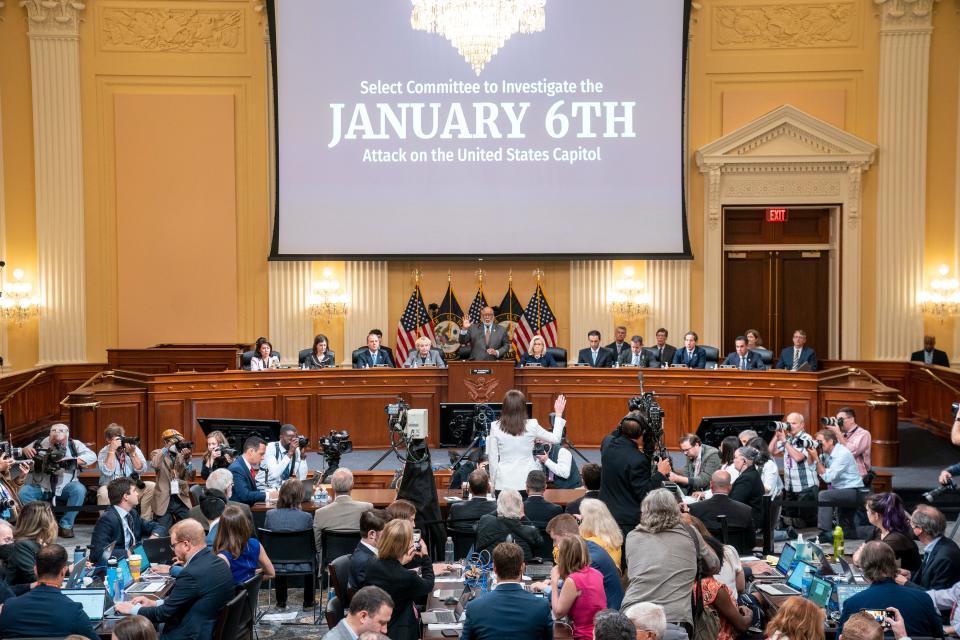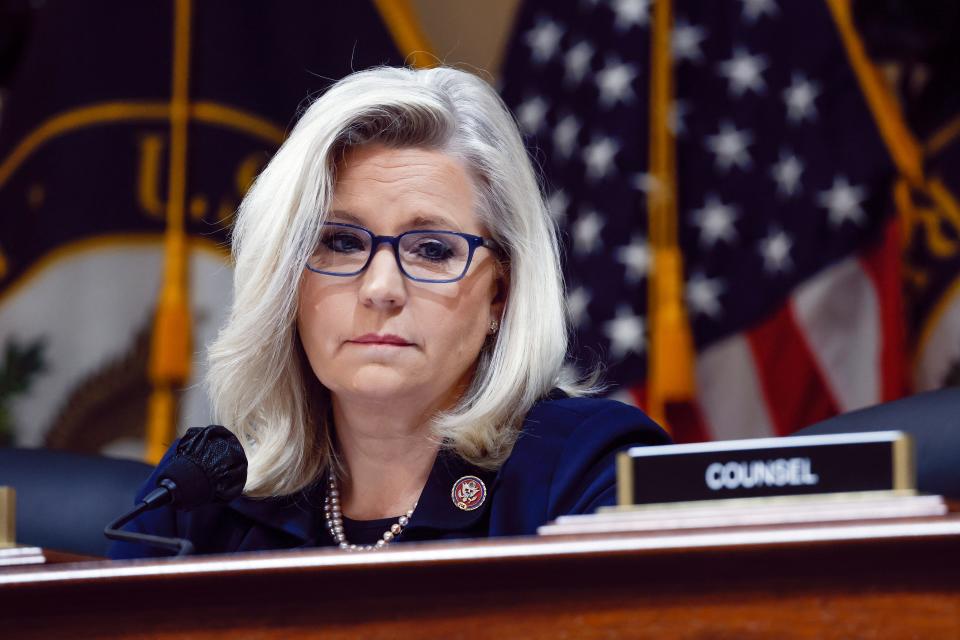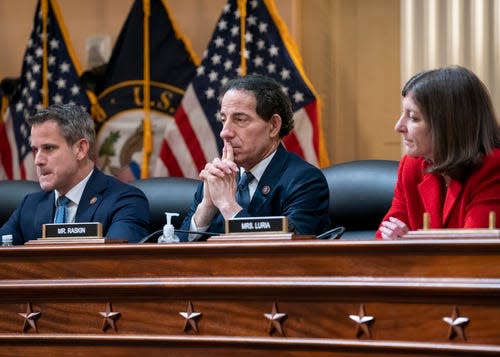Liz Cheney says it raises 'concerns' that Jan. 6 witnesses were contacted. Is it witness tampering?
Unnamed people contacted witnesses about their testimony in front of the Jan. 6 committee and referenced being "loyal" and reminded them that former President Donald Trump “does read transcripts,” according to the panel.
Rep. Liz Cheney, R-Wyo., declined to name the witnesses but shared parts of their depositions during a committee hearing Tuesday. She said they said made these comments after being asked whether “any former colleagues” had contacted them prior to their sworn testimony.
Former prosecutors and members of the committee who spoke to USA TODAY said the communications should be investigated as potential witness tampering or obstruction of justice.
A spokeswoman for the former president did not respond to an emailed inquiry for comment.
“It’s certainly enough to investigate further,” said Ann Rowland, who served as an assistant U.S. Attorney in the Northern District of Ohio from 1980 to 2018.
“The critical phrase is ‘corruptly influence,’” Rowland said, referencing the federal statute on witness tampering. “And so it all sort of hinges around the definition of the word ‘corruptly,’ and that probably depends on the relationship between the two people who are talking to each other.”
For example, Rowland said, it matters if one person in the conversation has power over the other person’s political or financial future.
Bombshells: What Cassidy Hutchinson said, what it means for Donald Trump

'Good graces in Trump World'
Cheney said the committee has heard from many Republicans who “testify fully and forthrightly” but contrasted their testimony with “evidence of one particular practice” of concern.
“Our committee commonly asks witnesses connected to Mr. Trump’s administration or campaign whether they’ve been contacted by any of their former colleagues who attempted to influence or impact their testimony,” Cheney said. “Without identifying any of the individuals involved, let me show you a couple of examples of answers we received to this question.”
On the screen, she showed excerpts from two witness statements.
“What they said to me is as long as I continue to be a team player, they know I’m on the team, I’m doing the right thing, I’m protecting who I need to protect, you know, I’ll continue to stay in good graces in Trump World,” one witness said.
“And they have reminded me a couple of times that Trump does read transcripts and just to keep that in mind as I proceed through my depositions and interviews with the committee,” that witness continued.
In a second example, a second witness said: “(A person) let me know you have your deposition tomorrow. He wants me to let you know that he’s thinking about you. He knows you’re loyal, and you’re going to do the right thing when you go in for your deposition.”
Cheney said after sharing the examples, “I think most Americans know that attempting to influence witnesses to testify untruthfully presents very serious concerns. We are discussing these issues as a committee and carefully considering our next steps.”
After the hearing, Rep. Jamie Raskin, D-Md., acknowledged that Americans are hungry for “individual criminal accountability” but said that is the jurisdiction of the Department of Justice, not the committee.
“It's a crime to tamper with witnesses,” said Raskin, a member of the committee. “It’s a form of obstructing justice. The committee won't tolerate it, and we haven’t had a chance to fully investigate or fully discuss it, but it's something we want to look into.”
Mark Meadows: Trump's chief of staff who defied Jan. 6 committee subpoena
Liz Cheney: Congresswoman calls Jan. 6 Capitol attack a 'conspiracy' and says threat is 'ongoing'

Is what Cheney described illegal?
Bruce Udolf, who was an assistant U.S. attorney in the Southern District of Florida from 1987 to 1997 and who later worked on the Whitewater investigation of former President Bill Clinton, pointed to a federal statute on witness tampering and said it’s “pretty much a no-brainer.”
“We know what the real message is,” Udolf said, referencing the messages about loyalty, “and for anyone to argue otherwise, that wouldn’t really pass the straight-face test. It’s obvious. It’s obvious what these individuals were attempting to do. They were attempting to influence, if not intimidate the witness.”
Harassing a witness in an official proceeding can carry three years in prison, Udolf said, but knowingly using intimidation “with intent to influence, delay or prevent the testimony of any person in an official proceeding” is a 20-year offense.
“I don’t think the department has much choice in this case than to investigate it as aggressively as possible,” he said.
Donald Ayer, who spent about a decade with the Department of Justice including as deputy attorney general, said prosecutors would need more information in order to determine whether obstruction of justice could be charged and proven.
“You would need to get a full picture of all the facts, and know exactly who did what,” Ayer said. “Often the toughest element to prove in a case like that is the intent of the person who might be charged with obstruction.”
E. Danya Perry, who served as an assistant U.S. attorney in the Southern District of New York from 2002 to 2013, said while it is still unclear who made those contacts and to whom, she would be surprised if the committee did not make a criminal referral for obstruction of justice or witness intimidation.
“Witness intimidation can certainly be made out of these kind of insinuations and dark premonitions and requests for a show of loyalty,” Perry said. “The prototype is, ‘That’s a beautiful face, shame if something would happen to it.’”
Trump and his allies were accused of obstruction of justice in 2019. More than 1,000 former U.S. attorneys signed a letter saying Trump’s actions related to special counsel Robert Mueller’s investigation into Russian coordination with the Trump campaign would be felony obstruction of justice against any person not protected by Department of Justice policies against indicting a sitting president.
“You can commit obstruction of justice without saying to somebody, ‘I want you to lie for me or I’ll kill you,’” said Aitan Goelman, a former assistant U.S. Attorney for the Southern District of New York. “You can be far more subtle about it and still be committing obstruction of justice.”
By the numbers: Who has been subpoenaed by the Jan. 6 committee?
'Combustible' testimony: Surprise Jan. 6 witness quietly drops bombshells

‘Mafia don’
Michael Cohen, a disbarred lawyer who worked as a lawyer for the Trump Organization before being sentenced to federal prison, said he heard an echo in the witness statements Cheney shared.
“It’s the same wording,” he said. “Loyal. He loves you. Stay on message. You’re part of the team. It’s exactly what a mob boss does before he gives the order to have you taken out.”
Udolf said the first example – about "Trump World" – was much more blatant than what one might normally see from someone in the mafia. He said that was surprising because “usually people who are doing that are smart enough to give themselves some cover.”
The second example Cheney presented is “the typical way mobsters talk when they’re attempting to influence someone,” he said, “which on the surface may seem to be more innocuous but, in fact, is more typical of the way that messages are sent by people who are attempting to influence a witness.”
Goelman said the concept of working for a "team" and whether people are "a friend of ours” are examples of mafia-like behavior.
“Trump’s conduct has been compared, rightly so, to a mafia don over and over again,” Goelman said. “I don’t think any of this is really new. It’s just a guy acting consistent with his character and the way he’s always acted.”
Contributing: Katherine Swartz, Dylan Wells, Chelsey Cox.
This article originally appeared on USA TODAY: Cheney concerned with Jan 6 witness contacts. Is it witness tampering?

 money
money 